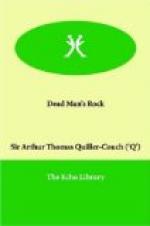Into its red heart I have looked once, and this was what I read:—of treachery, lust and rapine; of battle and murder and sudden death; of midnight outcries, and poison in the guest-cup; of a curse that said, “Even as the Heart of the Ruby is Blood and its Eyes a Flaming Fire, so shall it be for them that would possess it: Fire shall be their portion, and Blood their inheritance for ever.” Of that quest and that curse we were the two survivors. And what were we, that night, as we stood upon the sands with that last hellish glitter still dancing in our eyes? The one, a lonely and broken man; the other—
I turned to look at Colliver. He was huddled against the pit’s side, with his dark eyes gazing wistfully up at me. In their shining depths there lurked no more sanity than in the heart of the Great Ruby. As I looked, I knew him to be a hopeless madman, and knew also that my revenge had slipped from me for ever.
We were still standing so when a soft wave came stealing up the beach and flung the lip of its foam over the pit’s edge into the chest. I turned round. The tide was rising fast, and in a minute or so would be upon us. Catching Colliver by the shoulder, I pointed and tried to make him understand; but the maniac had again fallen to playing with the jewels. I shook him; he did not stir, only sat there jabbering and singing. And now wave after wave came splashing over us, soaking us through, and hissing in phosphorescent pools among the gems.
There was no time to be lost. I tore the madman back, stamped down the lid, locked it, and took out the key; then caught Colliver in my arms and heaved him bodily out of the trench. Jumping out beside him, I caught up the spade and shovelled back the wet sand as fast as I could, until the tide drove us back. Colliver stood quite tamely beside me all this while and watched the treasure disappearing from his view; only every now and then he would chatter a few wild words, and with that break off again in vacant wonder at my work.
When all was done that could be, I took my companion’s hand, led him up the sands beyond high-water mark, and then sat down beside him, waiting for the dawn.
And there, next morning, by Dead Man’s Rock they found us, while across the beach came the faint music of Polkimbra bells as they rang their Christmas peal, “Peace on earth and goodwill toward men.”
There is little more to tell. Next day, at low ebb, with the aid of Joe Roscorla (still hale and hearty) and a few Polkimbra fishermen whom I knew, the rest of my grandfather’s treasure was secured and carried up from the sea. In the iron chest, besides the gems already spoken of, and beneath the iron tray containing them, was a prodigious quantity of gold and silver, partly in ingots, partly in coinage. This last was of all nationalities: moidores, dollars, rupees, doubloons, guineas, crown-pieces, louis, besides an amount of coins which I could not trace, the whole proving a most catholic taste in buccaneering. So much did it all weigh, that we found it impossible to stir the chest as it stood, and therefore secured the prize piecemeal. Strangest of all, however, was a folded parchment which, we discovered beneath the tray of gems and above the coins. It contained but few words, which ran as follows—




